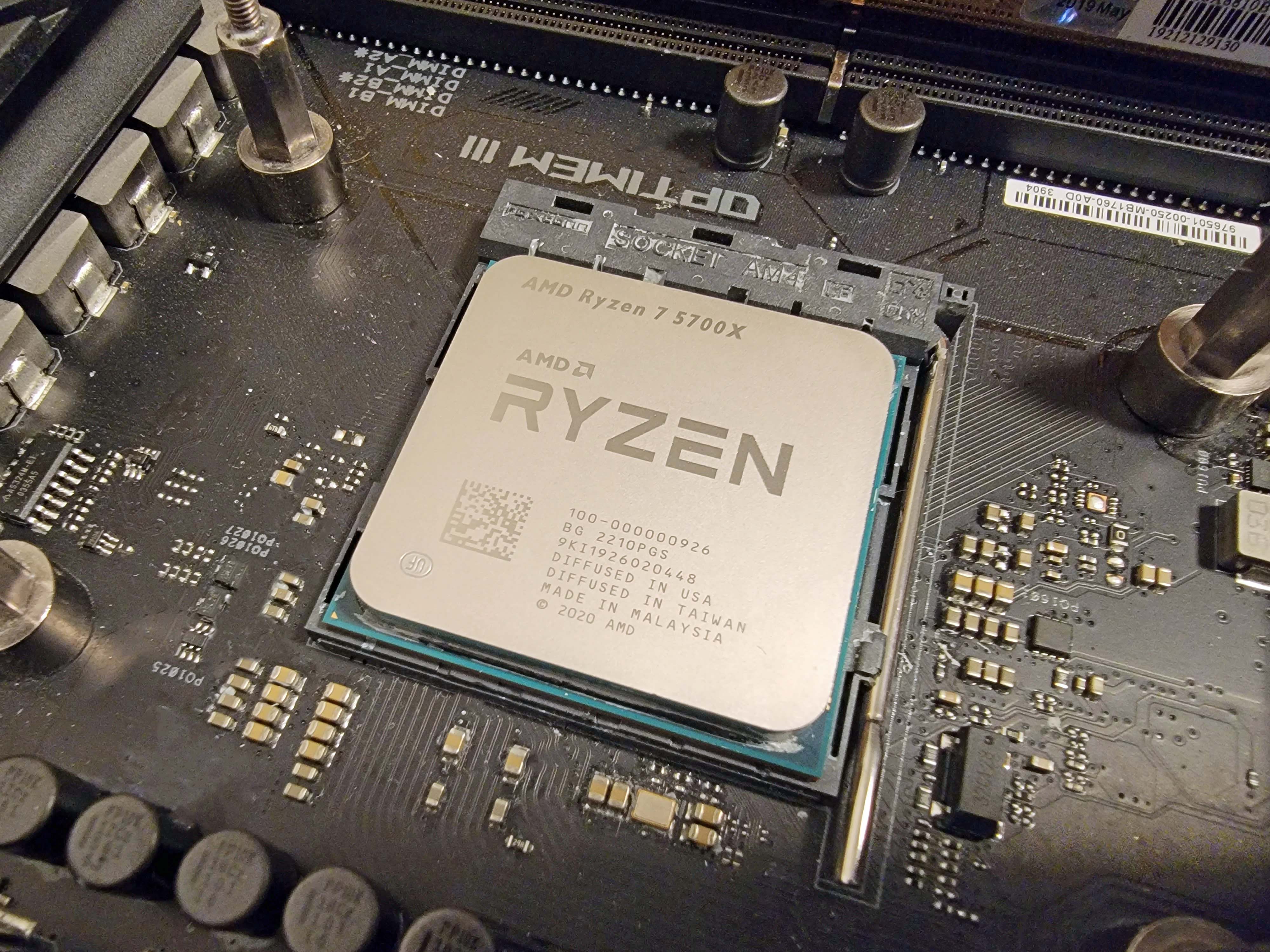Why you can trust Tom's Hardware
A Price Cut in Disguise
The Ryzen 7 5700X is the chip that enthusiasts longed for back in 2020, but today it simply serves as a price cut for the 5800X, but it comes disguised as a new product. Intel's Alder Lake lineup caught AMD flat-footed as we wait for its 5nm Ryzen 7000 ‘Raphael’ Zen 4 CPUs, so the company's recent refresh serves as a way to lower the pricing on its Ryzen 5000 family without publicly ceding ground through official price cuts on existing products. The Ryzen 7 5700X, like the rest of AMD's recent additions, arrives too late to market to make any real meaningful impact, particularly in comparison to the faster, less expensive Alder Lake alternatives.
Below, we have the geometric mean of our gaming test suite at 1080p and 1440p and a cumulative measure of performance in single- and multi-threaded applications. Remember that we conducted the gaming tests with an RTX 3090, so performance deltas will shrink with lesser cards and higher resolution and fidelity settings. We might see bigger performance deltas when new, more powerful GPUs arrive later this year.
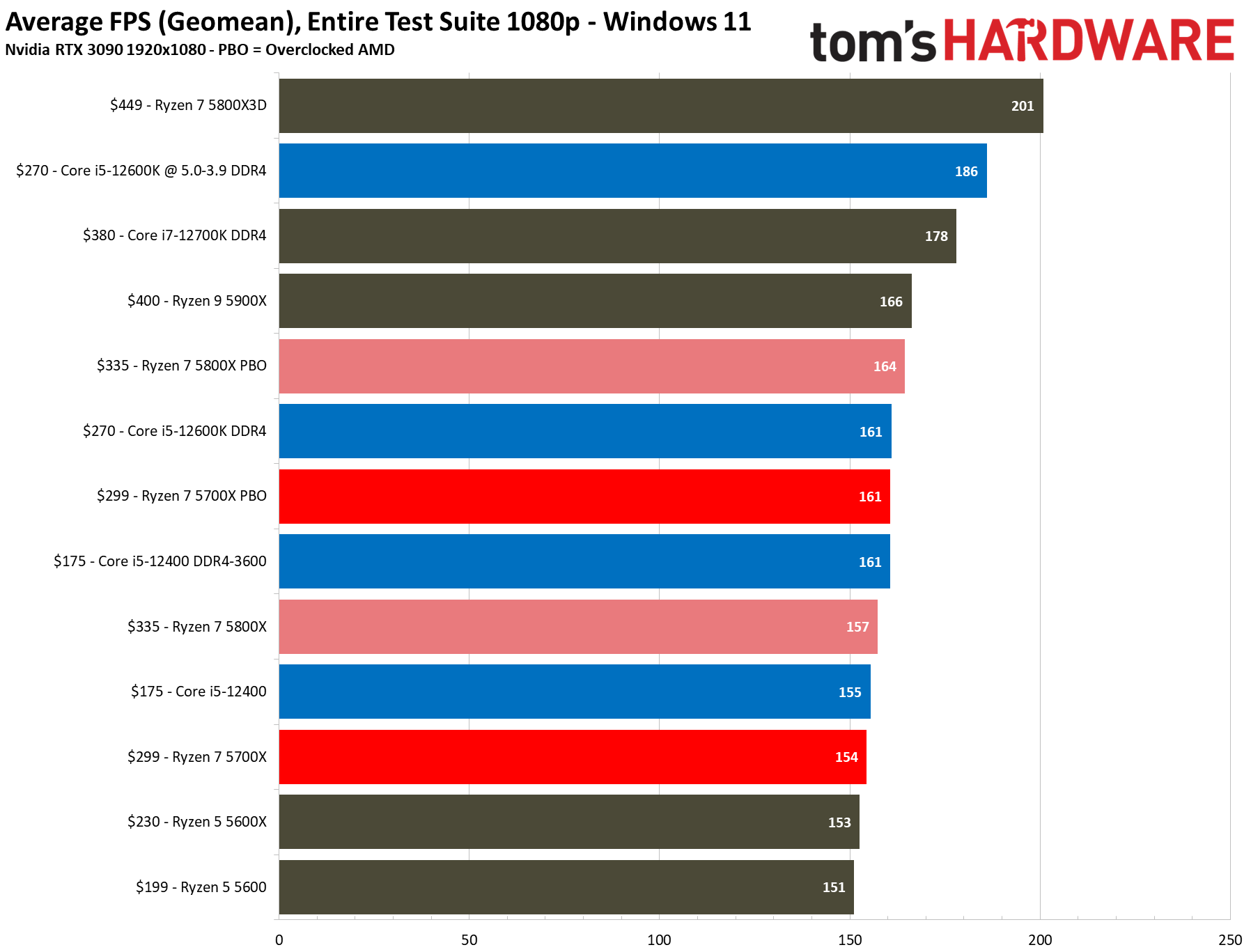
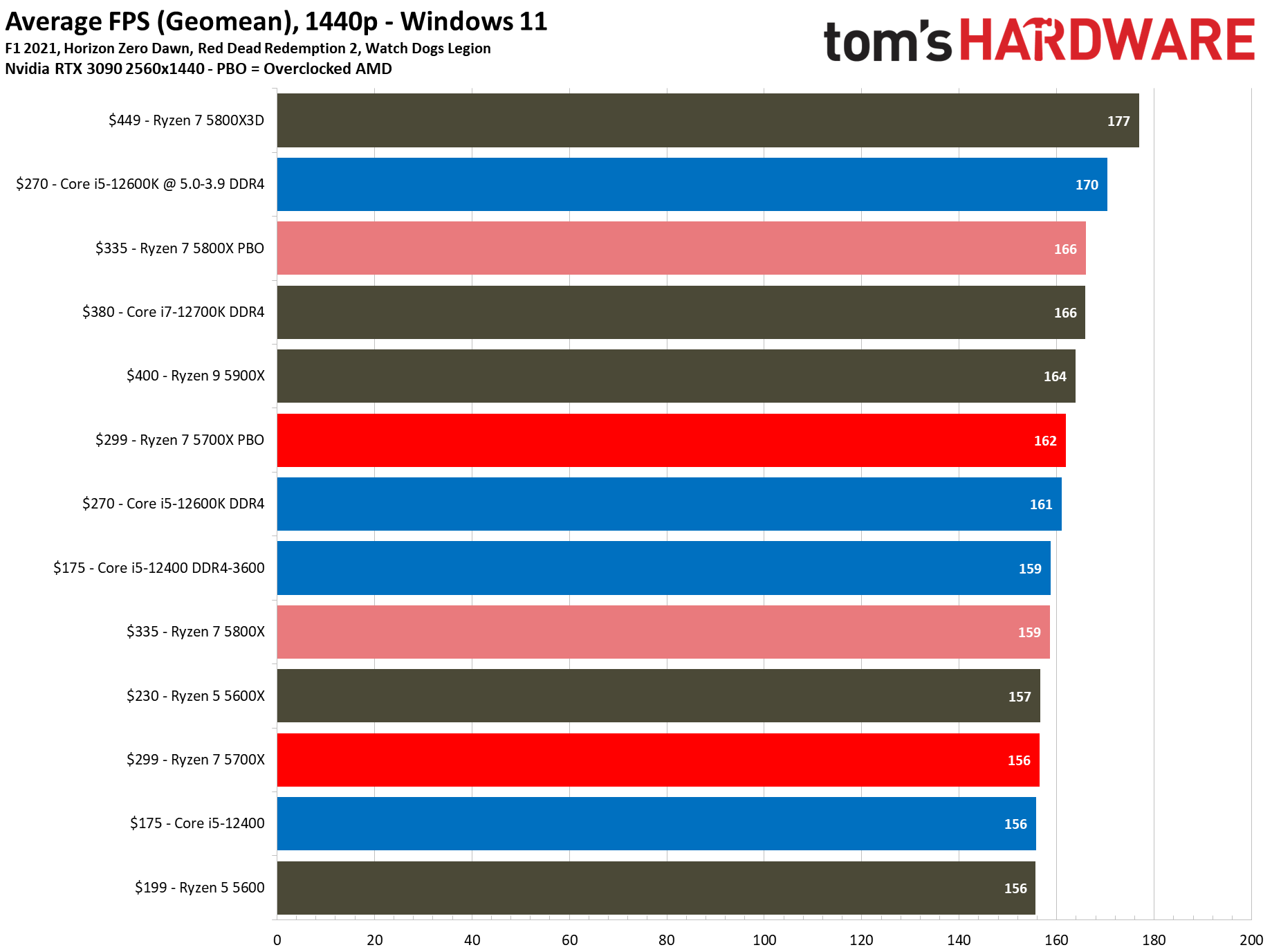
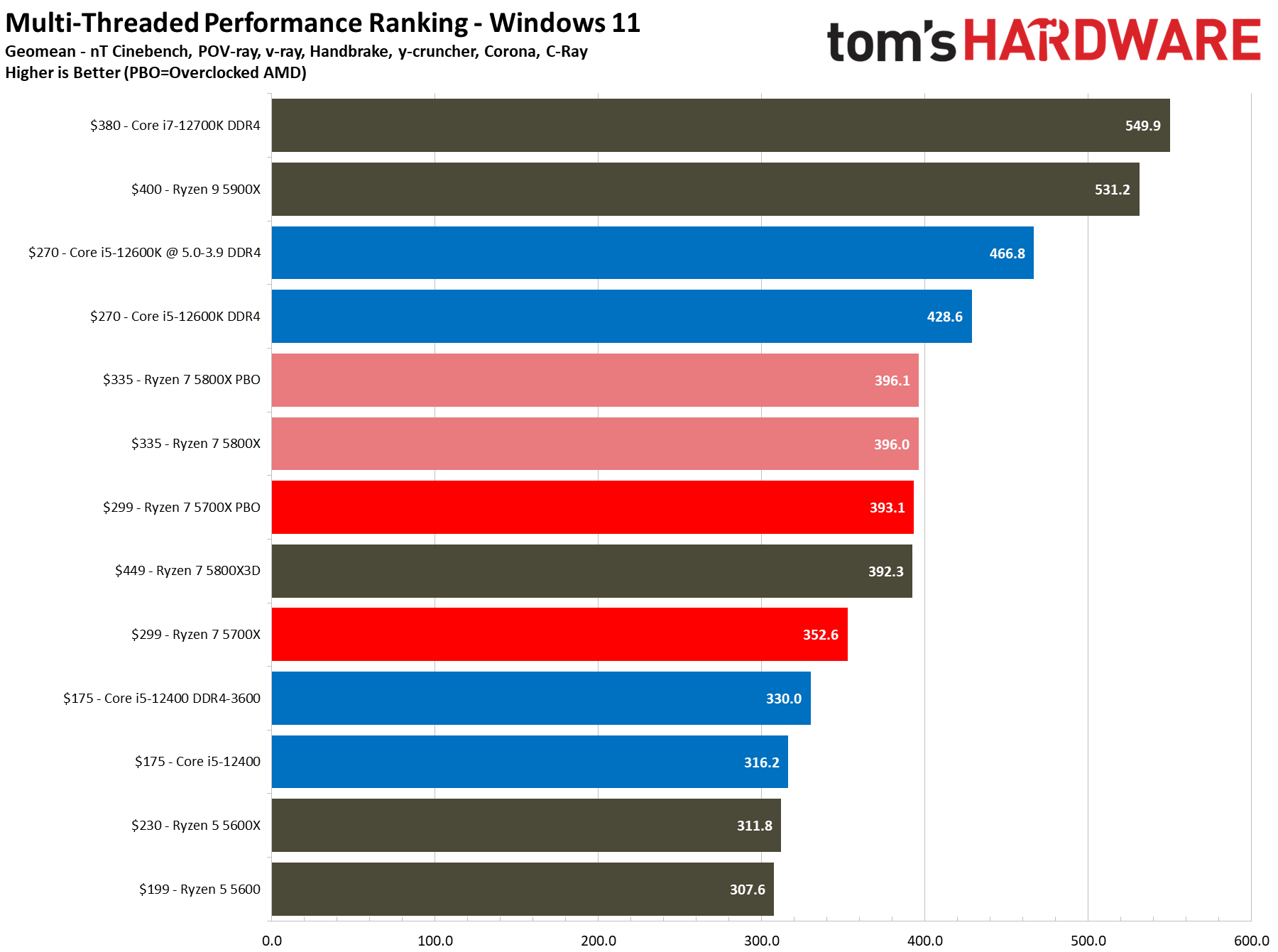
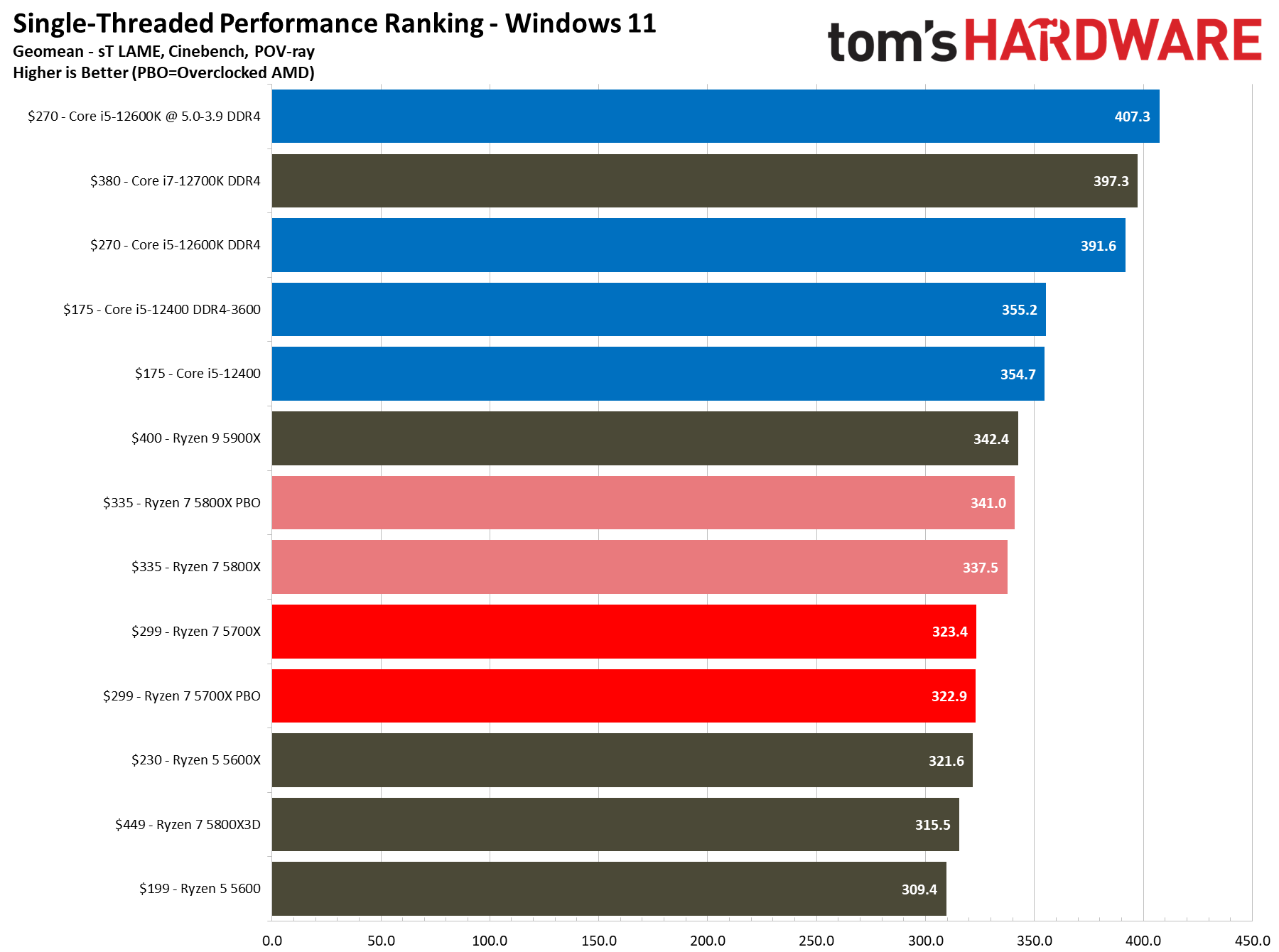
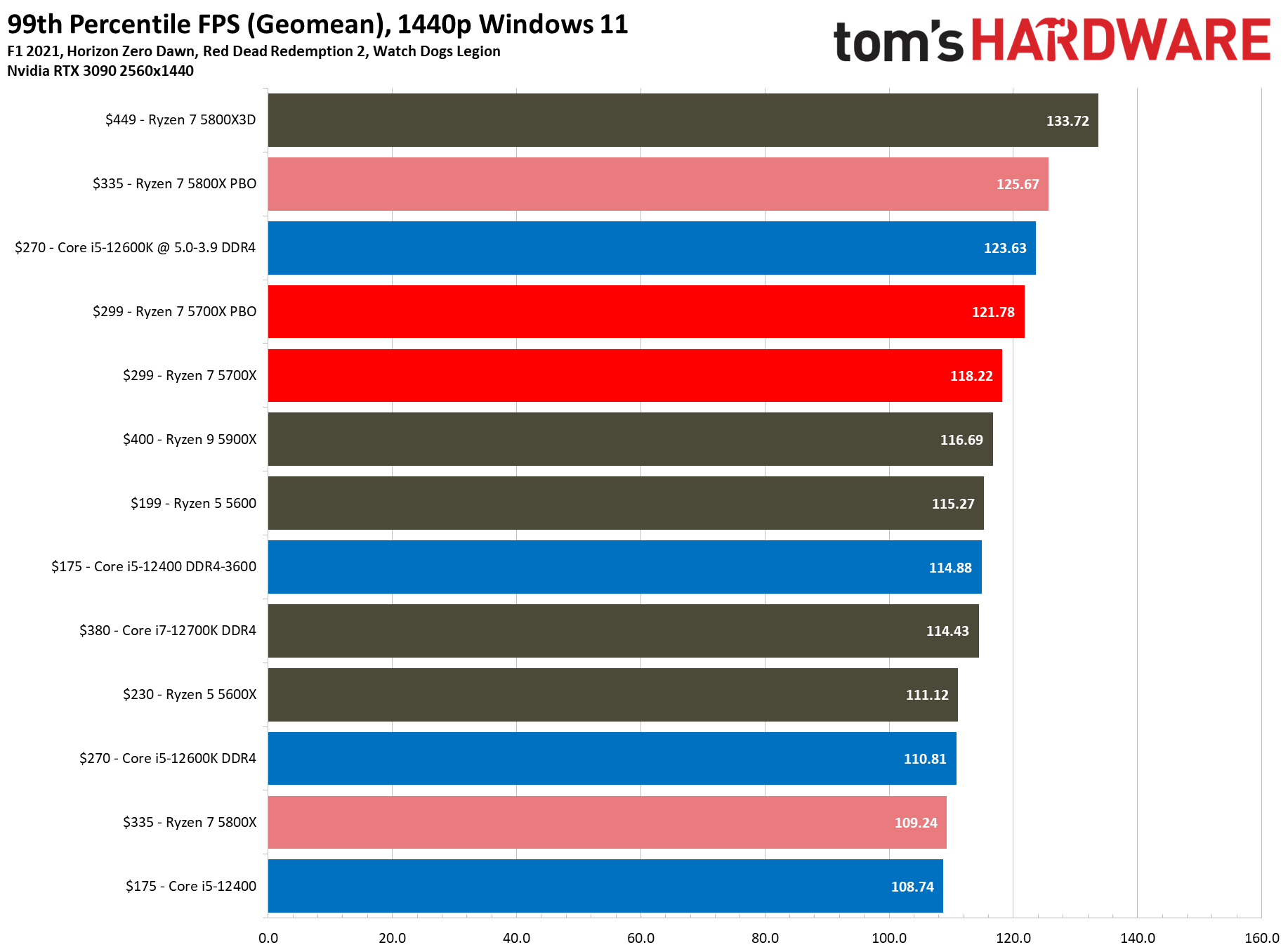
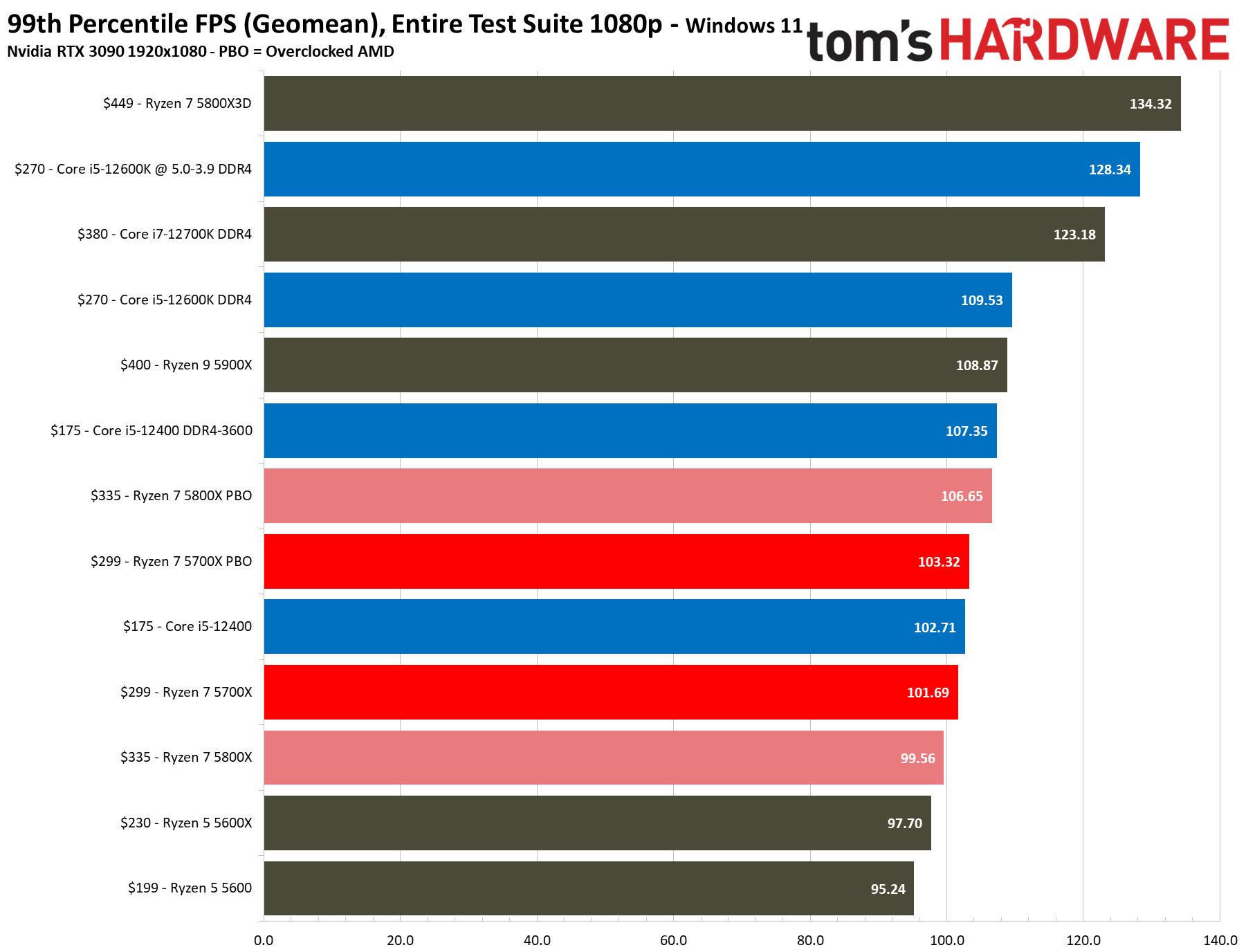
The $299 Ryzen 7 5700X doesn't do much to separate itself from the pack in gaming — even the $199 Ryzen 5 5600 is competitive here, but at a much lower price point. After a bit of tuning, the Ryzen 7 5700X is the equivalent of the 5800X, but that doesn't matter much given that the 5800X's positioning never made sense anyway.
The faster and more affordable Alder Lake alternatives outweigh the 5700X in either performance or value, and sometimes both. For example, at stock settings, the Intel Core i5-12600K is 4.5% faster than the 5700X in 1080p gaming and 15% faster after overclocking, but for $30 (10%) less. On the other hand, if you're only interested in gaming and looking for an even better value, the $175 Core i5-12400 offers comparable gaming performance to the Ryzen 7 5700X at both stock and overclocked settings, but for $125 (42%) less.
The Ryzen 7 5700X isn't competitive with Intel's chips in single-threaded applications, and it doesn't offer a meaningful advance over the other Ryzen 5000 chips. The 5700X does pull ahead of the Core i5-12400 in threaded workloads, but it commands a significant premium for that advantage. In contrast, the Core i5-12600K's e-cores contribute to a 21% lead over the Ryzen 7 5700X in our suite's most demanding threaded workloads, underlining the fact that 12600K is the faster chip in all facets. Surprisingly, the Core i5-12600K is still $30 less than the Ryzen 7 5700X.
That lower chip pricing helps offset some of the upcharge associated with Alder Lake motherboards; they are more expensive than AMD's Socket AM4 ecosystem. However, Alder Lake's access to more modern connectivity options, including the PCIe 5.0 and DDR5 interfaces, provides a more forward-looking platform. Intel's Socket 1700 will also host at least one (and perhaps two) more generations of chips, while AMD's AM4 is headed for retirement and doesn't offer the latest connectivity options.
Despite AMD's previous assurances that it would provide a cooler with all 65W and below Zen 3 chips, the company chose to skip the bundled cooler with the 65W Ryzen 7 5700X, adding additional cost if you're building a new system. For gaming-only builds, that completely eliminates the Ryzen 7 5700X from the competition with the Core i5-12400 that comes with a cooler and a much more amenable price tag.
The Ryzen 5000 chips can now drop into existing socket AM4 motherboards dating back to the 300-series that debuted in 2017, making them an attractive drop-in upgrade for some Ryzen owners. That upgrade path is even more important given the recent shortages and price hikes we've seen, and it might keep some Ryzen owners from jumping ship to Intel while they wait for affordable Zen 4 processors. Let's hope they don't have to wait until 18 months after the initial launch.
If you're looking to upgrade an existing gaming-focused Ryzen build, the Ryzen 5 5600 or 5600X offers comparable gaming performance to the Ryzen 5 5700X. These chips are a much better value, but they aren't as fast in threaded workloads. As such, the Ryzen 7 5700X only makes sense if you're upgrading an older Ryzen build and need more performance in threaded workloads.
The Ryzen 7 5700X isn't a good investment for new builds — you should look to the Intel Core i5-12400 or Core i5-12600K instead — and it is hard to recommend for gaming-focus rigs, even for Ryzen upgraders. Like the Ryzen 7 5800X before it, the 5700X is only appealing to Ryzen upgraders that want more performance in heavily-threaded workloads but can't or don't need to step up to the Ryzen 9 5900X. If you need to upgrade an older Ryzen system and are interested in gaming specifically, you should stick to the Ryzen 5 5600/X or step up to the Ryzen 7 5800X3D, which is currently the fastest CPU for gaming available.
- MORE: Zen 4 Ryzen 7000 All We Know
- MORE: Best CPUs for Gaming
- MORE: CPU Benchmark Hierarchy
- MORE: AMD vs Intel
Get Tom's Hardware's best news and in-depth reviews, straight to your inbox.

Paul Alcorn is the Editor-in-Chief for Tom's Hardware US. He also writes news and reviews on CPUs, storage, and enterprise hardware.
-
Liquidrider Ignoring the misleading article for one second. What is the point of this article? It's a serious question? Because there was a price cut?Reply
"Intel beats AMD in EVERY facet" 🤣 Really? Does power consumption no longer matter to your readers? A 50% difference seems significant
Intel includes a cooler. Does it include a motherboard too? Because that is what is required when you buy ANY of Intel's 12000 series.
What is more shocking is creating an article that complains about a price cut coming too late. 5700 was released two months ago. And who complains about a price cut regardless of what it comes. Maybe the point of this article was that Intel is becoming desperate to sell more CPUs before their next earnings.
I am not trying to be mean, but it is a little bit frustrating for wasting a reader's time to push nonsense. You may even take this comment as an example -
mathextremist ReplyAdmin said:We put AMD's Ryzen 7 5700X through the wringer in our expanse set of benchmarks.
AMD Ryzen 7 5700X Review: A Price Cut Disguised as a New Chip : Read more
Are we sure this isn't just the public release of a re-named, OEM-only Ryzen 7 5800 (non-X) from the Alienware Aurora? I can't see any difference in the specs at all. -
agello24 Reply
i agree with you 100%. Toms ALLWAYS finds something negative to say about AMD, then turns around and praises a weak INTEL chip with a higher price.Liquidrider said:Ignoring the misleading article for one second. What is the point of this article? It's a serious question? Because there was a price cut?
"Intel beats AMD in EVERY facet" 🤣 Really? Does power consumption no longer matter to your readers? A 50% difference seems significant
Intel includes a cooler. Does it include a motherboard too? Because that is what is required when you buy ANY of Intel's 12000 series.
What is more shocking is creating an article that complains about a price cut coming too late. 5700 was released two months ago. And who complains about a price cut regardless of what it comes. Maybe the point of this article was that Intel is becoming desperate to sell more CPUs before their next earnings.
I am not trying to be mean, but it is a little bit frustrating for wasting a reader's time to push nonsense. You may even take this comment as an example -
hotaru251 Reply
amd's spec page has oem cpu with a 5c higher max temp than 5700x.mathextremist said:I can't see any difference in the specs at all.
and on topic: if u go intel you HAVE to buy new MB alogn with the cpu (and possibly ram)
if ur upgrading from any zen1-zen3 its still better to stay on am4.
if u were going to go to intel and pay new chipset anwyays wait few months and go am5.
AM5 is goign to thrash 12th gen from leaks (and 13th gen doesnt look too much better than 12th gen from them leaks) & AMD has said they will keep AM5 for a long time like AM4 (so betetr future upgrade paths too) -
TerryLaze Reply
Which intel CPU are you comparing to to get that result?Liquidrider said:"Intel beats AMD in EVERY facet" 🤣 Really? Does power consumption no longer matter to your readers? A 50% difference seems significant
First of all a 65W TDP AM4 cpu draws at least 88W.
https://www.gamersnexus.net/guides/3491-explaining-precision-boost-overdrive-benchmarks-auto-ocSecondly if you compare to the 12600k at stock settings that has 125w TDP the intel CPU is also more than 20% faster and is still cheaper.
The i5-12400 draws 117W max, is only insignificantly slower than the 5700x in multithread and is almost half the price. -
scottscholzpdx Benchmarks are useless without including 2700x, 2700 (65w), 2600, 1500, 1600af, and 1800x. Those are the people who are interested in a chip such as this and the article even alludes to this. It's a drop in replacement in an aging platform.Reply
Why they wouldn't include these in benchmarks is mind boggling. No one cares how this compares to a 5900x. -
Juergenonly This article has been published weeks back when the 5700X was released. Why does it show up now on the home page? I don't see any new content that would justify it.Reply
Outside of that, I agree that it is a more power efficient version of the 5800X which I can see is why AMD does offer it. Power efficiency is an advantage they have over Intel at this point and until they come with their own next gen platform, what else outside lower pricing could they have offered? -
daeros Thanks Toms, for reminding us where your budget comes from.Reply
Intel beats AMD at every metric. You know, other than total platform cost, power consumption, gaming performance (thanks to the 5800X3D), and all-out performance for HEDT/workstation users (hello Threadripper Pro 5995WX). -
Why_Me Reply
Power consumption is more of a thing with laptops ... not so much with desktops. With that said a i7 12700F can be had for $15 USD more.Liquidrider said:Ignoring the misleading article for one second. What is the point of this article? It's a serious question? Because there was a price cut?
"Intel beats AMD in EVERY facet" 🤣 Really? Does power consumption no longer matter to your readers? A 50% difference seems significant
Intel includes a cooler. Does it include a motherboard too? Because that is what is required when you buy ANY of Intel's 12000 series.
What is more shocking is creating an article that complains about a price cut coming too late. 5700 was released two months ago. And who complains about a price cut regardless of what it comes. Maybe the point of this article was that Intel is becoming desperate to sell more CPUs before their next earnings.
I am not trying to be mean, but it is a little bit frustrating for wasting a reader's time to push nonsense. You may even take this comment as an example
https://www.amazon.com/Intel-i7-12700F-2-1GHz-6xxChipset-BX8071512700F/dp/B09NPJDPVG/
Intel Core i7-12700F $312.97
-
Wisecracker Uhhhhh ...Reply
Has not the AMD Ryzen 7 "x700X " nomenclature always included a "Tame 65W TDP" ___ like the AMD 8/16 core/thread Ryzen 7 3700X ??
Maybe Paul needs to reconsider his Verdict ...
